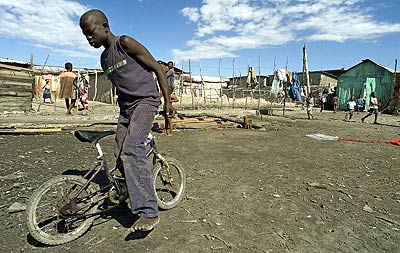
| Want to send this page or a link to a friend? Click on mail at the top of this window. |
| Posted December 19, 2003 |
 |
 |
| Reuters |
| The sad bicentennial of a once fabulous sugar colony |
| Port-Au-Prince |
| The opposition is trying yet again to get rid of President Jean-Bertrand Aristide in a long-misgoverned country |
ON JANUARY 1st 1804, Haiti became the world’s first independent black republic, after a successful 12-year revolt by slaves, inspired by Jacobin principles, ousted the French from what was then a fabulously rich sugar colony. But the bloody and destructive independence war helped to blight the fledgling republic. So did misgovernment. On independence day in 1904, President Rosalvo Bobo told his countrymen that he was “tired...of our stupidities” and lamented “a century of slavery of negro by negro”. He urged Haitians to mend their ways, so that by January 1st 2004 their descendants might have something to celebrate on their country’s bicentenary.
But now Haiti finds itself contemplating a second wasted century. It is the poorest country in the Americas (80% of its 7.5m people are poor) ; it leads the region only in AIDS, malnutrition and infant mortality. Yet its current president, Jean-Bertrand Aristide, is unlikely to be as penitent as Bobo. Mr Aristide, a former Catholic priest midway through his second term, doesn’t do self-criticism. He sees the bicentenary as a showcase for Haiti’s achievement of democracy and political tolerance after decades of dictatorships.
That is not how his opponents see matters. An alliance of opposition parties, civic groups and students is calling for his resignation. Militants have warned him not to show up for the bicentenary celebration in Gona´ves, the third city and a cradle of the independence struggle, following weeks of bloody protests there by angry former Aristide loyalists.
The president, a messianic populist, was once hugely popular among Haitians, and especially the poor. Elected in 1990, he was overthrown by a military coup nine months later, only to be reinstalled in power by American troops sent by President Bill Clinton. After Mr Aristide’s second election victory in 2000, disillusion has grown.
The factionalised opposition has boycotted the government ever since a dispute over alleged fraud in parliamentary elections in 2000. That prompted an aid cut-off that cost Haiti $500m. Discontent has simmered, over corruption, economic penury and government thuggishness.
It boiled over this month when pro-Aristide thugs, backed by police, broke into the national university and attacked students, wounding several. When the university rector tried to intervene, he was set upon and knee-capped with iron bars by the attackers. Mr Aristide later condemned the incident, but criticised the students. They have responded with daily demonstrations. “We are mobilised until he goes,” said Laurent Jimmyka, a student leader, as he dodged police tear gas.
The opposition, looking increasingly united, has joined in, along with businessmen and trade unions. A general strike on December 16th closed almost all businesses. The next day, police broke up a planned demonstration, leaving dozens injured.
So far, the protests have been largely limited to what pass for middle-class neighbourhoods in the run-down capital. Police and pro-government demonstrators hold the streets around the presidential palace, where hard-core loyalists chant “Aristide is King”. But the infamous slums of Port-au-Prince, where Mr Aristide was once considered a saviour, are strangely quiet. In Gona´ves, former gang leaders have switched allegiance, battling police daily in the slums. The heavily armed Special Brigade, an irregular police force, patrols the streets menacingly in black uniforms. Local residents accuse them of several killings.
Because of the street violence, work crews have been unable to put the finishing touches to the city plaza where the bicentenary ceremony is due to be held. But Mr Aristide says the celebration “must” go ahead. He has invited a host of heads of state, mostly from Africa and the Caribbean. One of the few who has so far accepted is South Africa’s Thabo Mbeki, who has taken the precaution of sending ahead a South African navy vessel, equipped with air crew and medics, to sit offshore.
Mr Aristide puts some of the political turmoil down to what he calls “democracy in the making”. He blames, too, the aid cut-off. Some aid is now flowing again, mainly from the Inter-American Development Bank. But continued support from the outside world may depend on the next round of parliamentary elections due in January. The government and opposition have yet to agree on the composition of the electoral authority. Time is running out. If elections do not take place, the resulting void might scupper future loans, which must be ratified by parliament.
The president accuses the opposition of deliberately holding up elections it would lose in order to undermine his government. Just in case the money is blocked, Mr Aristide is looking elsewhere. To coincide with the bicentennial, he is threatening to sue France for return of the FFr90m Haiti was forced to pay as an indemnity to its colonial master after independence. He has a point. Those reparations-$21.7 billion in today’s money, says the government-did much to vitiate Haiti’s first century of nationhood. But opponents argue that the case is a frivolous distraction from the country’s real problems. These start with its lamentable failure to turn democracy into a reality.
Reprinted from The Economist of December 19, 2003.
| Wehaitians.com, the scholarly journal of democracy and human rights |
| More from wehaitians.com |